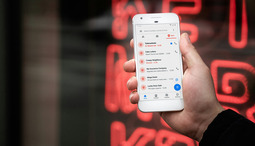- On
- 10 May 2023
- Reading time
- 5 minutes
It is no surprise that technology is transforming the way we shop, as it continues to revolutionise our lives. Traditional brick-and-mortar stores are being replaced by computerised malls offering higher convenience, immersion, and interactivity. In this article, we will explore the growth of computerised shopping centres in the UK and the future of shopping and provide life hacks and examples for navigating the digital maze of these modern malls. However, this is only possible with high-quality mobile communications. Read below about the challenges and how to boost mobile signals for a shopping centre in the UK.
The Growth of Computerised Malls in the UK
According to our partners from UCtel, we've seen significant growth in computerised malls in the UK over the past few years. These malls offer a seamless shopping experience that blends the physical and digital worlds. With features such as virtual maps, augmented reality displays, digital kiosks, and mobile payment options. Computerised shopping centres provide shoppers with a more immersive and convenient experience.
One of the biggest drivers of this growth is technology. With AI, robotics, and automation advancements, computerised malls are becoming more sophisticated, intuitive, and efficient. These malls are also environmentally friendly, with intelligent lighting and heating features that reduce energy consumption.
Some examples of successful computerised shopping centres in the UK include the Westfield London Mall, the Bullring Mall in Birmingham and the Manchester Arndale Mall. These malls have implemented technologies such as digital wayfinding, personalised recommendations, and intelligent parking to enhance the shopping experience for customers.
The Future of Shopping in the UK
So, what does the future of shopping look like in the UK? As Forbes claims - it will be even more digitised and personalised than it is today. With the rise of e-commerce and mobile shopping, brick-and-mortar stores must adapt to stay relevant.
Computerised malls are poised to be at the forefront of this transformation. In the future, we can expect to see even more advanced technologies, such as AI-powered chatbots, virtual changing rooms, and holographic displays. Additionally, these shopping centres will likely offer more personalised experiences, with features such as targeted advertising and personalised product recommendations based on customer preferences and purchase history.
Life Hacks for Shopping at Computerised Malls in the UK
While computerised malls offer many benefits, they can also be overwhelming to navigate. Here are some life hacks for making the most of your shopping experience at these modern malls:
- Download the mall's app for exclusive offers and discounts.
- Use virtual maps and GPS to navigate the mall.
- Take advantage of digital kiosks for easier transactions and access to information.
- Utilise mobile payment options to streamline the checkout
- Use augmented reality features to enhance the shopping experience.
Examples of Successful Implementation of Computerised Malls in the UK
The Westfield Stratford City Mall in London is an excellent example of a successful implementation of a computerised mall. The mall has implemented various technologies, including smart parking, digital wayfinding, and personalised recommendations. These features have helped enhance customers' shopping experience and make the mall more efficient.
Another example is the Intu Trafford Centre in Manchester, which has implemented a range of sustainability initiatives, such as smart lighting and heating. These initiatives have helped to reduce the mall's carbon footprint and make it more environmentally friendly.
Boosting mobile signals in busy shopping centres: A technical perspective
As more and more supermarkets and stores become computerised, customers increasingly rely on a stable mobile connection to fully take advantage of the “Internet of things” within the store. This includes everything from mobile payment options to digital signage and smart shopping carts. However, obstacles such as thick walls, metal structures, and large crowds of people can make it challenging to maintain a stable mobile signal while shopping.
Fortunately, mobile network operators such as UCtel offer a variety of techniques to help boost your mobile signal in these challenging environments. These techniques include:
- Small cells – low-powered base stations that offer coverage and capacity for a small area like a shop or a floor. They improve signal quality and offload traffic from the macro network, but they can cause interference with nearby cells if not coordinated properly.
- Distributed antenna systems (DAS) offer uniform coverage and capacity for a large area like a mall or a building. They use low-power antennas to reduce interference and power consumption, but can be expensive and complex to install and maintain.
- Repeaters – devices that extend coverage or fill gaps in coverage. Simple repeaters amplify all signals indiscriminately while smart. Repeaters selectively amplify only desired signals, but can introduce noise and distortion into the call.
- Femtocells – small base stations that connect to the leading network via broadband internet. They create a personal network for each user, enhancing signal quality and user experience. However, they can cause interference with the macro network or other femtocells if not correctly managed.
When selecting the best technique for a shopping centre, mobile network operators must consider various factors such as customer demand, network capacity, interference management, and cost-effectiveness. Careful planning and optimisation are necessary to ensure that the selected technique effectively and efficiently provides uninterrupted mobile services.
Unlocking the Future of Shopping: A Journey through Computerised Malls in the UK
As we've seen, computerised malls are transforming the future of shopping. By embracing the latest technologies and life hacks, shoppers can make the most of these new shopping opportunities and explore the future of retail in the UK. Computerised malls offer a world of possibilities, from personalised recommendations to augmented reality displays.
Conclusion
According to the expert opinion of Vinculum - navigating the digital maze of these malls can be daunting. Still, it can also be incredibly rewarding with the right tools and knowledge. However, taking advantage of computerised stores is only possible with high-quality mobile communication, achieved through amplifiers.
So, whether you're a tech-savvy shopper or a traditionalist, there's no denying that computerised malls are here to stay. The future of shopping is digital, and these malls are leading the way towards a more immersive, convenient, and personalised shopping experience. With advancements in technology continuing rapidly, we can only imagine what exciting innovations the future holds for computerised malls in the UK. So, why not embrace the future and journey through these modern shopping centres? Who knows, you might discover something truly extraordinary








